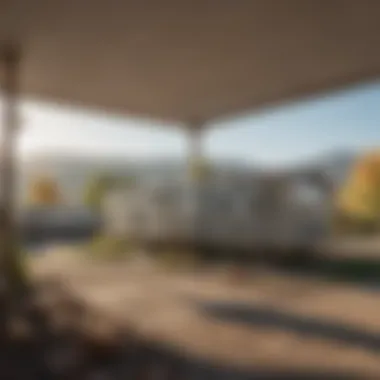Average Mobile Home Insurance Costs Explained


Intro
In the following sections, we will navigate through the essential elements of mobile home insurance. By delving into market trends, key influences, and practical tips, the reader will be equipped to make informed decisions.
Market Overview
Current Market Trends
The insurance market for mobile homes has shown a steady increase in demand as more individuals opt for this type of housing. The past few years have seen a notable shift as lifestyle changes prompt a renewed interest in affordable housing options. Mobile homes are often more accessible, which enhances their appeal in various demographics. As such, insurance providers have started to adapt their offerings to cater more effectively to this growing market.
Economic Indicators Impacting the Market
Several economic indicators affect the insurance costs associated with mobile homes. Key factors include interest rates, inflation, and overall economic stability. When inflation rises, the cost of repairs and replacements also increases, which directly influences insurance premiums. Additionally, regions experiencing economic growth may see higher property values, further impacting insurance costs.
Global Influences and Major Events
Global events, such as natural disasters or economic downturns, create ripple effects felt across many sectors, including mobile home insurance. For example, recent hurricanes have raised public awareness around the need for adequate insurance coverage. As a result, insurers may adjust their policies and premium rates to reflect these increased risks.
Factors Influencing Costs
Understanding what affects the cost of insurance is crucial. Numerous elements contribute to the premium amount, including:
- Location of the mobile home
- Age and condition of the mobile home
- Coverage limits chosen
- Deductible amounts
- Claims history of the homeowner
Assessing these factors can provide insights into how premiums are established and where potential cost-saving options might lie.
Coverage Options
Mobile homeowners have varying coverage options. A basic policy may cover essential areas, while more comprehensive plans typically include:
- Liability coverage
- Structural coverage that protects the home and property
- Personal property protection
Selecting the right coverage involves examining individual needs and potential risks.
Consider what you value most in your insurance to tailor your policy effectively.
Tips for Securing the Best Policies
Navigating the mobile home insurance market can be made simpler by following some practical steps. Here are some effective strategies:
- Shop Around: Get quotes from multiple insurers to compare prices and coverages.
- Review the Fine Print: Understand what is included and excluded from your policy.
- Consider Bundling: Look into multi-policy discounts if you have other forms of insurance.
Employing these tactics will help secure a policy that aligns with both your budget and coverage needs.
Prolusion to Mobile Home Insurance
Mobile home insurance is a crucial element for protecting an investment that often represents a significant portion of an individual's wealth. Understanding this kind of insurance is essential for homeowners who want to safeguard their mobile dwellings against unforeseen events, such as accidents, natural disasters, or theft.
Definition and Importance of Mobile Home Insurance
Mobile home insurance, also referred to as manufactured home insurance, is a specialized form of coverage designed to protect the unique risks associated with mobile homes. Unlike standard homeowner’s insurance, mobile home policies account for the mobility aspect, as mobile homes are often more vulnerable to certain events due to their structure and foundations.
The importance of this insurance can not be overstated. It functions on two primary levels: protection of property and liability coverage. The policy typically covers the structure of the mobile home itself, personal belongings inside, and liability support if someone is injured while on the homeowner's property. Without appropriate insurance, homeowners face potentially devastating financial losses, thus highlighting the necessity of securing a policy that best suits their needs.
Overview of the Mobile Home Market


The mobile home market has experienced noteworthy changes in recent years. This sector has gained attention driven by the increasing demand for affordable housing options. As more individuals seek alternative living arrangements, mobile homes present an appealing solution due to their relatively low costs and flexibility.
According to recent data, a significant percentage of the population resides in mobile homes, especially in certain regions of the United States. This relevance ensures that insurance providers are tailoring their offerings to meet the specific needs of this demographic. The market's evolution indicates a growing recognition of mobile homes not merely as transient accommodations but as permanent residences requiring responsible financial planning, including comprehensive insurance coverage.
Understanding the dynamics of the mobile home market is fundamental for prospective buyers and current owners, as it shapes the landscape of insurance costs and options available.
Factors Influencing Insurance Costs
Understanding the factors influencing insurance costs is fundamental for mobile home owners seeking adequate coverage. Insurance premiums are not a one-size-fits-all scenario; they vary significantly based on individual circumstances and broader market conditions. Therefore, grasping these elements can empower homeowners to make informed decisions. Factors such as the age and condition of the mobile home, its location, the types of insurance coverage chosen, and deductibles play crucial roles in determining costs.
Age and Condition of the Mobile Home
The age and condition of a mobile home are significant influences on insurance premiums. Older homes typically have higher insurance costs due to potential risks associated with outdated materials and systems. Homeowners with older mobile homes often face challenges in finding comprehensive coverage because insurers may perceive them as riskier. The condition also matters; a well-maintained mobile home can result in lower premiums compared to one needing repairs. Thus, maintaining a mobile home in good condition not only enhances safety but may also facilitate better insurance rates.
Location and Regional Considerations
Location greatly impacts insurance costs for mobile homes. Homes in areas prone to natural disasters, such as hurricanes or floods, generally incur higher premiums due to the increased risk. Additionally, urban areas may present different challenges than rural areas, affecting availability and affordability of coverage. Understanding local risks and regional norms can help homeowners navigate their insurance needs strategically and could lead to more favorable rates. A thoughtful assessment of one’s surroundings can bring insights into potential coverage gaps.
Insurance Coverage Options
Insurance coverage types can significantly alter costs. By understanding the differences in coverage options, mobile home owners can choose wisely.
Basic Coverage
Basic coverage forms the foundation of mobile home insurance. It typically covers essential risks, such as fire and theft, making it a standard choice for many. A key characteristic of basic coverage is its affordability; it is often less expensive than comprehensive options. However, it may not cover a broader range of risks, leaving homeowners vulnerable in certain situations. Homeowners need to assess the limits of basic coverage against their specific risks and financial situation before opting for it.
Comprehensive Coverage
Comprehensive coverage extends beyond the basics, providing a broader scope of protection against various perils. This coverage is advantageous for those seeking peace of mind, as it addresses multiple risks, including vandalism, weather-related damage, and more. A distinguishing feature of comprehensive coverage is its inclusivity, which can justify higher premiums. However, this insurance type may also come with limitations, such as exclusions for specific events. Homeowners should weigh the benefits against potential drawbacks to find the right balance.
Replacement Cost vs.
Actual Cash Value
The choice between replacement cost and actual cash value is pivotal in shaping insurance costs. Replacement cost coverage ensures that a mobile home can be rebuilt or replaced without factoring in depreciation, thus offering peace of mind during loss. Conversely, actual cash value considers depreciation, often resulting in lower premiums but also lower payouts in the event of a claim. Homeowners must carefully consider their financial condition and risk tolerance when making this decision, as it significantly impacts potential recovery in unforeseen circumstances.
Deductibles and Their Impact on Costs
Deductibles play a crucial role in determining insurance premiums. A higher deductible typically results in lower monthly payments, but comes with the trade-off of having to cover more in the event of a claim. Understanding the balance between deductibles and premium costs is key for mobile home owners. They must evaluate their financial situation and likelihood of making claims. A well-thought-out deductible choice can lead to significant savings or unexpected costs down the line.
Average Insurance Costs for Mobile Homes
Mobile home insurance is a critical aspect for many homeowners. Understanding average insurance costs gives potential buyers and current owners a better sense of what to expect financially. The importance of this topic lies not only in determining monthly or yearly expenses but also in ensuring adequate coverage for one’s investment.
Average insurance costs can vary significantly based on several critical factors including the type of coverage selected, the mobile home’s location, and the overall condition of the home. By grasping these elements, homeowners can make informed decisions that protect their financial interests.
National Averages and Trends
When examining the national averages for mobile home insurance costs, figures can serve as a benchmark for individuals assessing their own insurance expenses. On average, mobile home insurance insurance premiums range from $300 to $1,000 annually. This wide range reflects numerous influencing criteria, such as the age of the mobile home, its location, and the coverage types selected.
Over the years, trends in mobile home insurance indicate a gradual increase in premiums. Several factors contribute to this hike. These include rising natural disasters, which can impact claims and premiums on various properties, including mobile homes.
The following reasons contribute to trends in cost changes:
- Increased occurrence of severe weather events
- Adjustments in coverage options
- Evolving underwriting guidelines by insurance providers


Understanding these national averages helps homeowners gauge whether their premiums align with prevailing market conditions.
State-by-State Variations
It is important to note that insurance costs for mobile homes are not uniform across the United States. There are noticeable state-by-state variations, influenced by regional factors that include state laws, local weather patterns, and specific insurance market dynamics.
For instance, residents in Florida may pay higher premiums due to a greater risk of hurricanes. Conversely, states with fewer natural disaster concerns often exhibit lower average rates. Some essential aspects determining state variations include:
- Regulations: Different states have unique laws affecting insurance pricing and availability.
- Risk Factors: Locations susceptible to flooding, hurricanes, or wildfires generally incur higher premiums.
- Population Density: Areas with higher population densities tend to have more competition among insurers, occasionally leading to lower costs.
In summary, fully understanding both national averages and state-specific factors is crucial for making well-informed choices about mobile home insurance. This knowledge enables homeowners to strategize for their insurance needs more effectively, ultimately enhancing their financial planning process.
Additional Costs to Consider
When discussing mobile home insurance, additional costs must be in mind. These costs can significantly impact the overall financial responsibility of a mobile homeowner. Understanding these costs is crucial for budgeting and ensuring adequate coverage. Homeowners often overlook these expenses. This oversight can lead to underinsurance or unexpected out-of-pocket expenses when claims arise. Thus, it is prudent to delve deeper.
Assessing Additional Coverage Types
Liability Coverage
Liability coverage is an integral part of mobile home insurance. It protects homeowners from legal claims resulting from injuries or damages occurring on their property. This coverage is essential for safeguarding your assets against lawsuits. The key characteristic of liability coverage is its ability to provide financial support in case of legal disputes. This protection is a beneficial choice for mobile homeowners given the potential of accidents at homes. A unique feature of liability coverage is its capacity to cover medical expenses for injured visitors, even if the homeowner is not found negligent. Its advantages are clear; it secures financial peace of mind. However, it is crucial to consider policy limits, which can vary widely.
Personal Property Coverage
Personal property coverage is another significant aspect. It covers the belongings within the mobile home, such as furniture, electronics, and personal items. The primary role of this coverage is to safeguard valuables from risks like theft, fire, and natural disasters. Many homeowners find this coverage beneficial as it can replace or repair damaged items after an incident. One unique feature is the option to choose between actual cash value and replacement cost coverage. Actual cash value factors in depreciation, while replacement cost covers the complete expense of replacing items without depreciation. Weighing these options is vital for mobile owners to understand their coverage adequately. The main disadvantage can be the perceived cost. Many may think it adds a burden. However, not having it can lead to financial difficulties after unforeseen events.
Understanding Policy Limits
Policy limits determine the maximum amount an insurer will pay for a covered loss. Understanding these limits ensures that homeowners do not face inadequate coverage when filing claims. Homeowners should carefully review policy limits for each type of coverage included in their mobile home insurance. Underestimating these limits can lead to significant financial setbacks in the event of a disaster. Insurers will often set limits based on the value of the mobile home, its contents, and local market conditions. Regularly updating these limits can ensure adequate coverage as property values change. Ultimately, homeowners must align their policy limits with their replacement value to mitigate financial loss effectively.
How to Lower Mobile Home Insurance Costs
Lowering mobile home insurance costs is crucial for homeowners looking to manage their overall expenses without compromising coverage. Understanding how to effectively reduce insurance premiums can empower mobile homeowners to make informed financial choices. Such savings can mean the difference between adequate coverage or being underinsured, which is especially important given the unique challenges that mobile homes face.
Shopping Around for Quotes
Shopping around for insurance quotes is one of the most effective ways to find the best rate for mobile home insurance. Different insurance companies often offer varied premiums based on their own assessment of risk and coverage.
Most homeowners may not realize how much this can affect their overall costs. When looking for a policy, consider the following steps:
- Compare multiple insurance providers: Don’t settle for the first quote you receive. It's best to gather quotes from at least three to four companies to understand how prices vary.
- Use online comparison tools: Websites like NerdWallet or The Zebra can help you compare quotes side by side.
- Consult local agents: Sometimes, speaking to a local insurance agent can uncover options that online tools might miss, especially those related to regional risks.
Getting a comprehensive picture will help you identify which policy best aligns with both your budget and your insurance needs.
Increasing Deductibles to Reduce Premiums
Adjusting your policy's deductible is another effective way to lower your insurance costs. A higher deductible means you will pay more out-of-pocket in the event of a claim, but it can significantly decrease your premium payment.
When considering raising your deductible, keep in mind:
- Evaluate your financial stability: Can you afford a higher out-of-pocket expense if an incident occurs? If yes, this can be a smart move.
- Calculate potential savings: Sometimes increasing the deductible can lead to savings of up to 25% on your premium. Always ask the insurer how this affects your overall costs.
- Choose a deductible you can manage: Ensure that the deductible chosen is a figure that you can comfortably manage without financial strain.
Overall, increasing your deductible may provide notable short-term savings on your insurance payments.
Utilizing Discounts Offered by Insurers


Many insurers offer various discounts that can significantly affect the cost of mobile home insurance. Knowing what discounts are available can help you save money. Below are some common discounts to consider:
- Bundling policies: If you combine your mobile home insurance with auto or other types of insurance from the same provider, this often leads to a discount.
- Safety features: Installing safety measures like smoke detectors, security systems, or fire extinguishers can make you eligible for discounts.
- Continuous coverage: Some companies offer a loyalty discount if you have maintained continuous coverage without lapses.
- Retirement discounts: If you are retired, some insurers provide lower rates as they consider retired individuals to be less risky customers.
Utilizing these discounts can help reduce your overall mobile home insurance costs significantly, allowing you to optimize your coverage options.
Navigating the Claims Process
Navigating the claims process is a crucial aspect of understanding mobile home insurance. When an incident occurs, knowing how to effectively file a claim can significantly impact the outcome of any financial recovery. Proper navigation of the claims process ensures timely responsiveness and can aid in receiving fair compensation for losses incurred. This knowledge equips homeowners with the confidence to tackle unforeseen events with clarity and purpose.
Filing a Claim: The Basics
Filing a claim is the first step in addressing any damage or loss to a mobile home. The process generally begins by notifying your insurance company about the incident. Immediate action is essential, as many policies require claims to be reported within a certain time frame.
Steps for Filing a Claim:
- Review Your Policy: Understand what is covered and what is not. This shapes expectations and claim success.
- Document the Incident: Take photographs and gather evidence of damages or losses. This can strengthen your claim.
- Contact Your Insurer: Call the company to initiate the claims process. Be prepared to provide details about the incident.
- Fill Out the Claim Form: Most insurers will require a written claim. Complete the form thoroughly, ensuring accuracy.
- Follow Up: Stay engaged with your insurer. Ask for updates and provide any additional information they may request.
Navigating this stage carefully can often ease the road toward resolution.
Tips for a Successful Claim
A successful claim hinges on several factors, including thorough preparation and clear communication with your insurer. Here are some practical tips:
- Keep Records: Maintain all correspondence with your insurance company. Document dates, names of representatives spoken to, and any instructions received.
- Stay Organized: Arrange all relevant documents in one place. This may include the original policy, receipts for repairs, and forms submitted.
- Be Honest and Detailed: Provide accurate and complete information to avoid complications or denial of claims.
- Use Local Contractors: If repairs are needed, select local tradespeople who are familiar with mobile home repairs. This can help facilitate faster approvals.
- Follow Up Regularly: Consistent communication with your insurer reduces the chance of delays. Politely inquire about the status of your claim.
Following these tips brings clarity and may enhance the quality of the claims experience.
Future Considerations in Mobile Home Insurance
Future considerations in mobile home insurance are critical for both current and prospective homeowners. As the landscape of insurance continues to evolve, understanding these implications will help homeowners navigate potential challenges and changes in their coverage needs.
Trends Influencing Mobile Home Insurance Costs
Insurance costs for mobile homes are influenced by numerous trends. One significant trend is the increasing frequency of natural disasters. Climate change has led to a rise in extreme weather events, affecting how insurers calculate risk and determine premiums. Homeowners should be aware that areas prone to hurricanes, floods, or wildfires might see higher insurance costs.
Another important trend is the advancement of technology in insurance underwriting. The use of big data allows insurers to better assess risks associated with mobile homes. As devices that collect environmental data become more prevalent, they may change the way risks are evaluated. This could lead to more accurate premium calculations but may also expose vulnerabilities in older homes.
Additionally, there is a growing preference for sustainable housing. More insurers are beginning to offer discounts for energy-efficient mobile homes. Homeowners who invest in sustainable options may benefit financially while contributing positively to the environment.
Legal and Regulatory Impacts
Legal and regulatory factors also play a considerable role in shaping mobile home insurance. Changes in legislation can directly affect the coverage requirements and policies available. For example, some states may implement stricter building codes or safety regulations impacting where and how mobile homes can be located.
Moreover, regulations concerning liability insurance can change, potentially increasing requirements for homeowners. It is essential to stay informed about any local or state legislative changes that may affect the insurance landscape.
Understanding these legal frameworks is crucial for homeowners. They can significantly shape cost structures and coverage availability in the future.
Homeowners should also consider that political climate can influence insurance frameworks. Changes in leadership can lead to shifts in policy, impacting everything from premium rates to disaster recovery programs. Staying updated on these issues will provide clarity and direction in managing mobile home insurance effectively.
The End
The topic of mobile home insurance is vital for several reasons. Understanding the costs involved is crucial for both current and prospective mobile homeowners. This conclusion summarizes key points that were covered throughout the article, reinforcing the overall understanding of mobile home insurance.
Summarizing Key Points
- Insurance Cost Factors: Various elements influence the insurance premiums for mobile homes. This includes the age and condition of the home, its geographical location, and the chosen coverage type.
- Average Costs: Awareness of national averages and state-by-state variations can better prepare homeowners in budgeting for insurance.
- Additional Coverages: Homeowners should be aware of optional coverages, such as liability and personal property, which can greatly influence the overall insurance cost.
- Cost Reduction Strategies: Strategies for lowering insurance costs, such as shopping for quotes and adjusting deductibles, are essential considerations for budget-conscious individuals.
- Future Trends: Emerging trends and regulatory changes will continue to shape the mobile home insurance landscape, making it necessary for homeowners to stay informed and adaptable.
Final Thoughts on Insurance for Mobile Home Owners
For mobile home owners, thoughtful consideration of insurance is necessary. The costs associated with it can directly impact financial stability. By understanding various aspects, such as calculating average insurance premiums and evaluating coverage options, owners can make more informed choices.
Moreover, staying updated on trends and legal aspects will enhance their capacity to manage risks effectively. Mobile home insurance is not merely a requirement; it serves as a safeguard, protecting both property and peace of mind.



